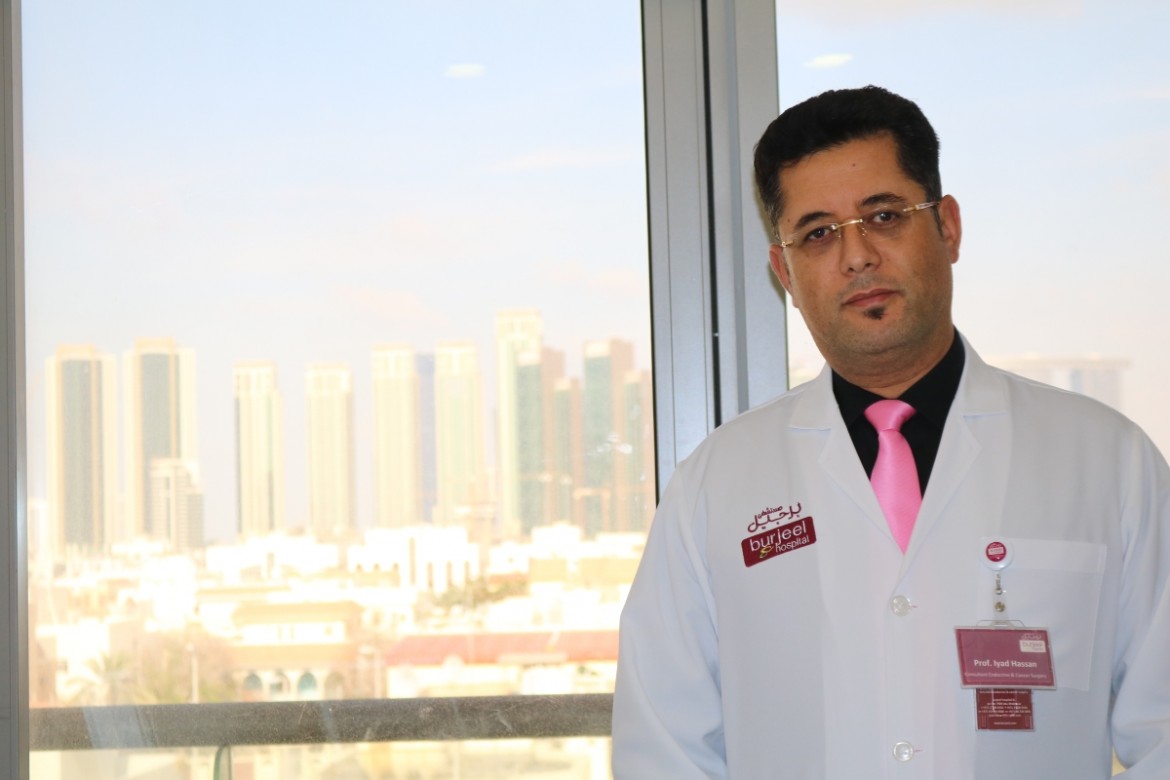About Prof. Dr. Iyad Hassan
Prof. Dr. Iyad Hassan completed his MBBS at Philipps University of Marburg, Germany in 1998. He qualified for the German Board of Surgery in 2005 and for the German Board of Visceral Surgery in 2007. In 2012, he became a fellow of the American College of Surgeons (FACS) and in 2013, a fellow of the Royal College of Surgeons – Glasgow (FRCS). Prof. Dr. Iyad worked as Consultant for Endocrine and Surgical Oncology in the University Hospital of Marburg for 10 years. In 2009, he moved to the UAE and held the post as Head of General, Vascular, and Thoracic Surgery in a large government hospital in Abu Dhabi for 5 years and before 30 months moved as chair of surgery to the largest private Hospital which is 7 stars category in Abu Dhabi (Burjeel hospital). You can also read more about him here.
Here’s the excerpt from the interview with Prof. Dr. Iyad Hassan
Hello Doctor, Where are you practicing currently and how many years have you been into Endocrine Surgery?
I have been for almost 20 years into Endocrine Surgery. I was lucky to start my surgical carrier in the biggest Endocrine Surgery center at the university Hospital of Marburg in Germany. I am practicing in best hospitals in Abu Dhabi, Dubai, and Sharjah so that all citizens of UAE with their different insurance plans can have easy access to our excellent minimally invasive endocrine and cancer Surgery service which allow fast recovery and less scar building with best cosmetic results.
Why did you choose Endocrine Surgery, Surgical Oncology as your specialty?
An Endocrine/ Cancer disorder is like a quiz or a crime story very common caused by small tumors very difficult to localize. It needs a lot of efforts to find and resolve the problem. This requires experience, intelligence and good teamwork with other colleagues such as radiology, nuclear medicine, Oncology, Gastroenterology, and Endocrinology. This human interaction was always fascinating to me. I love the fact to see Patient cured and have totally different and better quality of life after the Surgery done and the guilty tumor has been eliminated.
What is the scope for technology in Endocrine surgery and what are new things that can be introduced?
Since the expansion of endoscopic and minimally invasive Surgery at the late 80s dramatic changes happened to the benefits of the Patient. The Use of Neuro monitor devices for Vocal cord nerves during Surgery made it possible to perform Total Thyroidectomy with one Inch incision and without wound drain the patient can be discharged at the same day or next day. With the modern localization technology and intraoperative Hormone measurements for Parathyroid gland disorder, the incision is 1-2 cm only and the surgery time is between 4-15 minutes only and can be done in local anesthesia. The same is applicable for adrenal and pancreatic tumors. We can perform those types of surgeries with keyhole technology, surgery is done faster and more secure with faster recovery and earlier return to work which is becoming more important to our patients all this also with better cosmetics.
What are the kinds of patients you usually work with?
The bread and butter of endocrine surgery, thyroid, parathyroid, adrenal and pancreatic tumors and hyperfunction of those glands. However, as a gastrointestinal surgical oncologist, I see benign and malignant disorders of the gastrointestinal tract. I am also consulted on basically any abdominal issues and this includes male and female hormonal, benign and malignant disorders. Both males and females might consult me for any of the hormonal disorders of the 4 glands (Thyroid, Parathyroid, Adrenal, and Pancreas). Specifically, females may also consult me for Gallstones and abdominal hernia and male for acid reflux and inguinal hernia since we use the latest minimally invasive and fastest performance of such procedures.
What is your advice to young doctors wanting to pursue this field?
I would like to advice young doctors to keep the following principles always in mind. Patients centered care is the Key to success. Every patient has to be treated as own family member. Always be open for new updates and innovations to the best of your patients.
What do you like most and least about your specialty?
The most I like about my specialty is the fact that every patient and every surgery is thrilling even at the end of the day the name of the procedure and the disease is the same as every day. This is showing that human are different than machines. The Anatomy and physiology are like a thumbprint, somehow unique for every individual. The least I like about my specialty is when cancer has spread and I cannot offer the patient a great help. This makes me very sad.
From your perspective, what is the biggest challenge within your own specialty?
The biggest challenge within my own specialty remains the ductal cancer of Pancreas in particular and in general, is the metastatic cancer which cannot be cured with all treatments modalities available.
Where do you see your specialty in 10 years?
Since the cancer incidence in general and in particular the thyroid cancer is dramatically increasing all around the world due to lifestyle changes and environmental pollution and other factors, I believe Endocrine Surgery will become more popular and will move towards less invasive surgery such as natural orifice surgery through the mouth for thyroid and parathyroid glands and trans gastric for adrenal and pancreatic endocrine tumors.
How do you maintain the work-life balance? What do you like to do for relaxation or stress relief?
This is a very difficult issue in the life of a surgeon. Fortunately, my family understands well the commitment of a surgeon to his Patients. However, I have a well-organized team so that I can use flexible working arrangements and I can spend time with my family and friends. For relaxation and stress relief I like to go for long walk and swimming.
